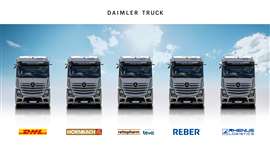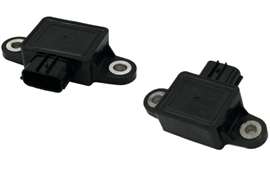Read this article in Français Deutsch Italiano Português Español
Daimler Truck enters second trial phase with fuel cell trucks
24 November 2025
 Hornbach, Reber Logistik, Teva Germany, Rhenus and DHL Supply Chain will each deploy a Mercedes-Benz GenH2 Truck on their regular logistics routes within Germany. (Photo: Daimler Truck)
Hornbach, Reber Logistik, Teva Germany, Rhenus and DHL Supply Chain will each deploy a Mercedes-Benz GenH2 Truck on their regular logistics routes within Germany. (Photo: Daimler Truck)
Following the completion of initial customer trials of its Mercedes-Benz GenH2 trucks, Daimler Truck is starting the planned second phase with five partner companies in order to prepare its fuel cell trucks for series production. Hornbach, Reber Logistik, Teva Germany (with its brand ratiopharm), Rhenus and DHL Supply Chain will each deploy a Mercedes-Benz GenH2 Truck on their regular logistics routes within Germany.
The goal of the second phase is to test use cases across various industries and capture additional operating scenarios, and to ensure that all findings feed directly into further vehicle development as well as preparations for sales and service processes.
The Mercedes-Benz GenH2 has a gross vehicle weight of around 40 tons and a payload of approximately 25 tons, with technical specifications that the company said are on par with modern diesel long-haul trucks. Its fuel cell system delivers a continuous output of up to 300 kW, supported by a small buffer battery to provide situational power support during peak loads and to recover energy during braking. Liquid hydrogen is used as the energy source, with refueling taking place at dedicated liquid hydrogen (sLH2) stations in Woerth am Rhein and the Duisburg area.
In the initial trial phase, the five fuel cell trucks covered more than 225,000 km in total, with average hydrogen consumption ranging between 5.6 and 8.0 kg per 100 km, depending on use case, and an average combined vehicle weight between 16 and 34 tons. For the second phase, all five fuel-cell trucks will be deployed by the partners over a period of one year on different routes under real operating conditions in various logistics applications – from temperature-controlled pharmaceutical transport to general cargo transport in international long-distance transport.
In parallel, Daimler Truck said it has started developing the next generation of its fuel cell trucks. As part of a small-series production, a total of 100 tractor units will be built at the Mercedes-Benz plant in Woerth and put into customer operations starting at the end of 2026.
POWER SOURCING GUIDE
The trusted reference and buyer’s guide for 83 years
The original “desktop search engine,” guiding nearly 10,000 users in more than 90 countries it is the primary reference for specifications and details on all the components that go into engine systems.
Visit Now
STAY CONNECTED




Receive the information you need when you need it through our world-leading magazines, newsletters and daily briefings.
CONNECT WITH THE TEAM













